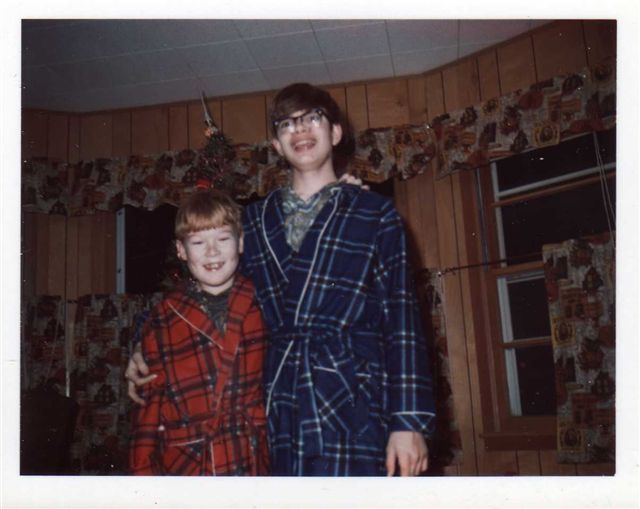A sorrow’s crown of sorrows is remembering happier things.
Alfred Tennyson, “Locksley Hall”
Archives for December 2012
TT: A memory of Christmases past
Louis Armstrong recites Clement Moore’s “The Night Before Christmas.” This was Armstrong’s last commercial recording. He made it at his home in Queens on February 26, 1971, five months before his death:
TT: Lookback
From 2003:
I’m glad to be a self-made man, and I also find it surprisingly useful to have been born into a small-town family. For one thing, the experience of growing up in southeast Missouri made me a cultural realist. (I learned early on that there’s no such thing as a really famous writer.) It has also given me an understanding of Red America not shared by many New Yorkers of my acquaintance. I’ve changed a lot since I left town in 1974, but part of me remains deeply rooted in the place where I grew up. I’m like a walking, talking focus group: I almost always know what will fly in southeast Missouri, and what will flop….
Read the whole thing here.
TT: Almanac
“Happy, happy Christmas, that can win us back to the delusions of our childish days; that can recall to the old man the pleasures of his youth; that can transport the sailor and the traveller, thousands of miles away, back to his own fireside and his quiet home!”
Charles Dickens, The Pickwick Papers
TT: Christmas at home
 David and Kathy, my brother and sister-in-law, are in Houston, where they’ll be spending Christmas with my niece and her husband. David mentioned to me the other day that this will be his first Christmas away from home. That says something–quite a lot, really–about the place where I come from and the family into which I was born. Even after I grew up and moved away, I made every possible effort to return to Smalltown at Christmastime, and more often than not I succeeded. I doubt I’ve been anywhere else more than a half-dozen times in my life.
David and Kathy, my brother and sister-in-law, are in Houston, where they’ll be spending Christmas with my niece and her husband. David mentioned to me the other day that this will be his first Christmas away from home. That says something–quite a lot, really–about the place where I come from and the family into which I was born. Even after I grew up and moved away, I made every possible effort to return to Smalltown at Christmastime, and more often than not I succeeded. I doubt I’ve been anywhere else more than a half-dozen times in my life.
Not so this year. As I recently mentioned, I’m spending the holidays in Connecticut with Mrs. T and her family. We marked the occasion last week by putting up a Christmas tree, our first in six years.
Buying the tree was easy enough. There’s no shortage of places to pick up a Christmas tree in a small country town. Trimming it proved to be another matter. Life, as it has a way of doing around this time of year, got complicated. I was so busy knocking out columns for The Wall Street Journal and working on my Duke Ellington biography that I couldn’t think about anything else. Day after day went by without our finding time to festoon our little tree with tinsel, ornaments, and twinkling lights. Then Mrs. T got into the act.
I drove down to Yale last Tuesday to spend the day sifting through five boxes of Ellington-related oral-history transcripts. I was so tired by the time I got back home that I wasn’t good for much else beyond dinner and an unchallenging movie, after which I fell into bed and sank into a deep, dreamless sleep. The next morning I got up, went into the living room, and saw that Mrs. T had trimmed the tree while I slept.
 I thought of one of my favorite moments in Satchmo at the Waldorf, the scene in which Louis Armstrong tells the audience about his first Christmas tree. I put the words in Armstrong’s mouth, but it’s a true story:
I thought of one of my favorite moments in Satchmo at the Waldorf, the scene in which Louis Armstrong tells the audience about his first Christmas tree. I put the words in Armstrong’s mouth, but it’s a true story:
We get married, Lucille goes out on the road with me and it’s Christmas. Come back to the hotel after the show and there’s a little tree right there in the room, all lit up like nothing you ever seen before. She done trimmed it and put on the lights for old Pops! Now I ain’t never had no Christmas tree before. We couldn’t afford nothing like that back in New Orleans. Then I go out in the world, hit the road, nobody ever thought to put up no tree for me in no hotel room–not until Lucille. I come in, see that tree in the corner, and she say, “Merry Christmas, Louis!” And you know what? I wouldn’t let her turn it off. Lay in bed all night looking at them pretty lights winking and blinking, and I say to myself, “Satch, you done lucked out. Better do what you gotta do to hang onto that gal. You ain’t gonna do no better long as you live.”
All at once I heard in my mind’s ear the cheering sound of Satchmo rasping his way through “Winter Wonderland,” a song that my mother sang to me every night when I was a child. It was a decidedly idiosyncratic choice of lullaby, especially in the summertime, but I loved the song so much that I insisted. She was, as always, happy to oblige.
I dreamed the other night that I was calling my mother from a taxi en route to Broadway, the way I used to do whenever I went there to see a play. I assured her that I’d be home for Christmas in a few days, going on to say that I intended to make an extra-special effort to visit her more often in the year to come. Then I woke up.
Needless to say, I won’t be seeing her for Christmas save in my dreams, but I will be home–home with Mrs. T, gazing with delight at the tree that she trimmed for us. Home is where my spouse is, be it in New York or Connecticut or parts unknown, and I don’t need anyone to tell me that I’m not going to do any better as long as I live. Like Pops, I lucked out.
* * *
Louis Armstrong sings “Winter Wonderland” in 1952, accompanied by a studio orchestra led by Gordon Jenkins:
TT: Just because
Benjamin Britten’s A Ceremony of Carols, performed by Roger Allen and the treble voices of the Choir of St. Peter’s College, Oxford:
(This is the latest in a series of arts-related videos that appear in this space each Monday and Wednesday.)
TT: Almanac
“Mankind are always happier for having been happy; so that if you make them happy now, you make them happy twenty years hence by the memory of it. A childhood past with a due mixture of rational indulgence, under fond and wise parents, diffuses over the whole of life, a feeling of calm pleasure; and, in extreme old age, is the very last remembrance which time can erase from the mind of man.”
Sydney Smith, Elementary Sketches of Moral Philosophy
WHAT’S WRONG, DOC?
“For those baby boomers who grew up watching Warner Bros. cartoons on television every Saturday morning, the inexorable demise of Bugs and his friends has been a source of nostalgic dismay. But for critics and scholars who believe that the best studio-era animated cartoons are comparable in quality to the best live-action screen comedies of the 1930s and 40s, it is a catastrophe…”
